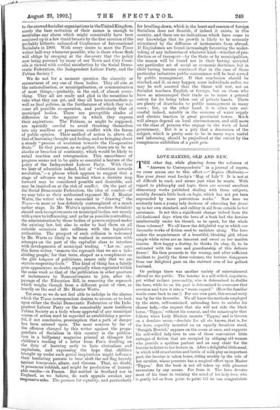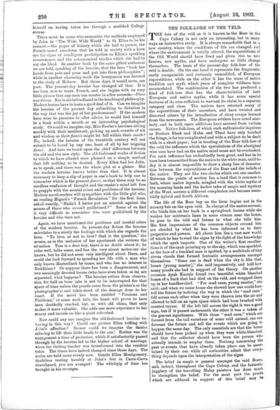LOVE - MAKING, OLD AND NEW. T HE other day, while glancing down
the columns of "Answers to Correspondents" in a journal of repute, we came across one to this effect :—".Regina (Malvern).— Has your fiance read Lecky's Map of Life' ? It is not at all difficult to read, and seems just what he wants. With regard to philosophy and logic, there are several excellent
elementary works published dealing with these subjects, notably Jevons's little book on logic, which has not yet been
superseded by more pretentious works." Now here we evidently have a young lady desirous of educating her fiance up to her own standard, and calling in aid from outside to her assistance. Is not this a significant change indeed from the old-fashioned days when the hero of a book had the heroine intellectually under his thumb, so to speak, for the whole three volumes ? We all know the delightful way in which our favourite works of fiction used to undulate along. The hero makes the acquaintance of a beautiful, blushing girl, whose simple white robes are as innocent and sweet as her maiden fancies. How happy a destiny, he thinks (in chap. 2), to be entrusted with the care and guardianship of this delicate flower! He then proceeds to the wooing, and after sufficient incident to justify the three volumes, the heroine disappears from our delighted gaze on the stalwart arm of her gallant husband.
Or perhaps there was another variety of entertainment offered to the public. The heroine is a self-willed, impulsive, yet withal radiant personality, who is determined to dislike the hero, while he on his part is determined to overcome that aversion and turn it into a " warm regard." (How the familiar words come back to one !) For our own part, this second motif was by far the favourite. We all know the methods employed by the stern, self-contained, unbending hero to subdue his chosen lady,—the request that she will not ride the black horse, Tippoo,' without his consent, and the catastrophe that follows when Lady Disdain mounts ' Tippoo,' and is thrown on a desolate moor,—desolate for all she knows, that is, for the hero, superbly mounted on an equally ferocious steed, Surajah Dowlab,' appears on the scene at once, and supports his self-willed lady-love to one of those convenient little cottages of fiction that are occupied by obliging old women who provide a spotless parlour and an easy chair for the heroine to listen to her lecture in. After a delightful little meal, in which wild strawberries and bowls of milk play an important part, the heroine is taken home, riding meekly by the side of her cavalier, whose presence has a magical effect upon Master 'Tippoo.' But the book is not all taken up with pleasure excursions by any means. Far from it. The hero devotes most of his time to training the mind of his lady-love, who is gently led on from point to point till he can congratulate himself on having taken her through a modified College course.
There must be some who remember the methods employed by John in " The Wide, Wide World " to fit Ellen to be his consort,—the pages of history which she had to peruse, the French moral anecdotes that he told in society with a keen eye for signs of intelligent participation on Ellen's speaking countenance, and the astronomical studies which she had to say she liked. In another book by the same gifted authoress we are told, speaking of the heroine, that the hero "took her hands from pots and pans and put into them philosophies "; while in another charming work the honeymoon was devoted to the study of Hebrew. But those days, it would seem, are past. The present-day heroine has changed all that. It is her turn now to teach French, and she begins with an easy little phrase that any man can master in a few seconds,—Place aux dames. Nor is she behindhand in the teaching of philosophy. Modern heroes have to learn a good deal of it. Can we imagine the heroine of the present day submitting to dictation in the way that was the joy of her predecessors? If the modern hero were to presume to offer advice, he would find himself in a book within a month as an interesting psychological study. Or could we imagine, say, Miss Fowler's heroines sitting meekly with their needlework, picking up such crumbs of wit and wisdom as their fiances might let fall within their reach ?
No, indeed, the heroine of the twentieth century will not
submit to be bored by any one, least of all by her reigning fiance. And here we touch upon the chief difference between
the old and the new style. The old-fashioned works of fiction to which we have alluded were planned on a simple method that left nothing to be desired. Every Ellen had her John, so to speak, and there was the whole plot at a glance. But the modern heroine knows better than that. It is almost necessary to keep a slip of paper in one's book to help one to
remember which is the present fiancé, so that there may be no
needless confusion of thought and the reader's mind left free to grapple with the mental crises and problems of the heroine.
Modern novel-readers will sympathise with the little girl who, on reading Mignet's " French Revolution " for the first time, asked wearily, " Hadn't I better put an asterisk against the
names of those who weren't guillotined ? " Some of us find it very difficult to remember who were guillotined by the heroine and who were not.
Again, we have mentioned the problems and mental crises of the modern heroine. In present-day fiction the heroine calculates to a nicety the feelings with which she regards the hero. " To love, or not to love ? that is the question," she muses, as in the seclusion of her apartment she reviews the situation. Tom is a dear boy, there is no doubt about it; he rides well, talks sense, and has the very nicest motor-car she knows, but he did not seem very intelligent about Ibsen, and could she look forward to spending her life with a man who only knows Maeterlinck by name, and who has no interest in Buddhism P Or suppose there has been a disagreement, and two seemingly devoted lovers (who have even taken us in) are separated, what happens ? The heroine retires from observa- tion for half an hour (she is not to be interrupted for that space of time unless the proofs come from the printer's or the photographer's) and takes stock of the damage done to her heart. If the novel has been entitled " Passions and Problems," or some such title, the heart will prove to have been decidedly cracked, but, as with old china, that only makes it more valuable. She adds one more experience to her rosary and travels on like a giant refreshed.
Now could any one imagine the old-fashioned heroine be- having in this way? Could one picture Ellen trifling with John's affection ? Sooner could we imagine the daisies refusing to lift their little heads to the sun ! Rather was the engagement a time of probation, which if satisfactorily passed through by the heroine led to the higher school of marriage, when the visiting teacher was transformed into the resident tutor. The times have indeed changed since those days. The scales are held more evenly now. Gentle Ellen Montgomery, doubtless resting humbly at John's feet in Carra-Carra churchyard, you are avenged! The whirligig of time has brought in his revenges.







































 Previous page
Previous page